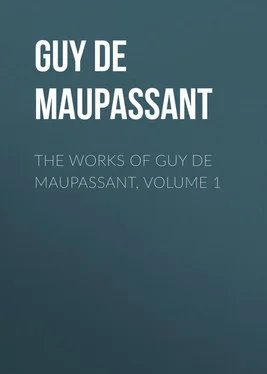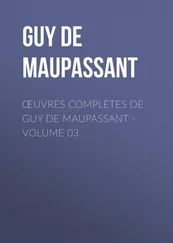Guy Maupassant - The Works of Guy de Maupassant, Volume 1
Здесь есть возможность читать онлайн «Guy Maupassant - The Works of Guy de Maupassant, Volume 1» — ознакомительный отрывок электронной книги совершенно бесплатно, а после прочтения отрывка купить полную версию. В некоторых случаях можно слушать аудио, скачать через торрент в формате fb2 и присутствует краткое содержание. Жанр: literature_19, foreign_antique, foreign_prose, на английском языке. Описание произведения, (предисловие) а так же отзывы посетителей доступны на портале библиотеки ЛибКат.
- Название:The Works of Guy de Maupassant, Volume 1
- Автор:
- Жанр:
- Год:неизвестен
- ISBN:нет данных
- Рейтинг книги:4 / 5. Голосов: 1
-
Избранное:Добавить в избранное
- Отзывы:
-
Ваша оценка:
- 80
- 1
- 2
- 3
- 4
- 5
The Works of Guy de Maupassant, Volume 1: краткое содержание, описание и аннотация
Предлагаем к чтению аннотацию, описание, краткое содержание или предисловие (зависит от того, что написал сам автор книги «The Works of Guy de Maupassant, Volume 1»). Если вы не нашли необходимую информацию о книге — напишите в комментариях, мы постараемся отыскать её.
The Works of Guy de Maupassant, Volume 1 — читать онлайн ознакомительный отрывок
Ниже представлен текст книги, разбитый по страницам. Система сохранения места последней прочитанной страницы, позволяет с удобством читать онлайн бесплатно книгу «The Works of Guy de Maupassant, Volume 1», без необходимости каждый раз заново искать на чём Вы остановились. Поставьте закладку, и сможете в любой момент перейти на страницу, на которой закончили чтение.
Интервал:
Закладка:
Guy de Maupassant
The Works of Guy de Maupassant, Vol. 1 Boule de Suif and Other Stories
INTRODUCTION
BY
ARTHUR SYMONS
The first aim of art, no doubt, is the representation of things as they are. But then things are as our eyes see them and as our minds make them; and it is thus of primary importance for the critic to distinguish the precise qualities of the eyes and minds which make the world into imaginative literature. Reality may be so definite and so false, just as it may be so fantastic and so true; and, among work which we can apprehend as dealing justly with reality, there may be quite as much difference in all that constitutes outward form and likeness as there is between a Dutch interior by Peter van der Hooch, the portrait of a king by Velasquez, and the image of a woman smiling by Leonardo da Vinci. The soul, for instance, is at heart as real as the body; but, as we can hear it only through the body speaking, and see it only through bodily eyes, and measure it, often enough, only in the insignificant moment of its action, it may come to seem to us, at all events less realizable; and thus it is that we speak of those who have vividly painted exterior things as realists. Properly speaking, Maupassant is no more a realist than Maeterlinck. He paints a kind of reality which it is easier for us to recognize; that is all.
Every artist has his own vision of the world. Maupassant's vision was of solid superficies, of texture which his hands could touch, of actions which his mind could comprehend from the mere sight of its incidents. He saw the world as the Dutch painters saw it, and he was as great a master of form, of rich and sober color, of the imitation of the outward gestures of life, and of the fashion of external things. He had the same view of humanity, and shows us, with the same indifference, the same violent ferment of life – the life of full-blooded people who have to elbow their way through the world. His sense of desire, of greed, of all the baser passions, was profound: he had the terrible logic of animalism. Love-making, drunkenness, cheating, quarreling, the mere idleness of sitting drowsily in a chair, the gross life of the farmyard and the fields, civic dissensions, the sordid provincial dance of the seven deadly sins, he saw in the same direct, unilluminating way as the Dutch painters; finding, indeed, no beauty in any of these things, but getting his beauty in the deft arrangement of them, in the mere act of placing them in a picture. The world existed for him as something formless which could be cut up into little pictures. He saw no farther than the lines of his frame. The interest of the thing began inside that frame, and what remained outside was merely material.
A story of Maupassant, more than almost anything in the world, gives you the impression of manual dexterity. It is adequately thought out, but it does not impress you by its thought; it is clearly seen, but it does not impress you specially by the fidelity of its detail; it has just enough of ordinary human feeling for the limits it has imposed on itself. What impresses you is the extreme ingenuity of its handling; the way in which this juggler keeps his billiard-balls harmoniously rising and falling in the air. Often, indeed, you cannot help noticing the conscious smile which precedes the trick, and the confident bow which concludes it. He does not let you into the secret of the trick, but he prevents you from ignoring that it is after all, only a trick which you have been watching.
There is a philosophy of one kind or another behind the work of every artist. Maupassant's was a simple one, sufficient for his needs as he understood them, though perhaps really consequent upon his artistic methods, rather than at the root of them. It was the philosophy of cynicism: the most effectual means of limiting one's outlook, of concentrating all one's energies on the task in hand. Maupassant wrote for men of the world, and men of the world are content with the wisdom of their counting-houses. The man of the world is perfectly willing to admit that he is no better than you, because he takes it for granted that you will admit yourself to be no better than he. It is a way of avoiding comparison. To Maupassant this cynical point of view was invaluable for his purpose. He wanted to tell stories just for the pleasure of telling them; he wanted to concern himself with his story simply as a story; incidents interested him, not ideas, nor even characters, and he wanted every incident to be immediately effective. Now cynicism, in France, supplies a sufficient basis for all these requirements; it is the equivalent, for popular purposes, of that appeal to the average which in England is sentimentality. Compare, for instance, the admirable story "Boule de Suif," perhaps the best story which Maupassant ever wrote, with a story of somewhat similar motive – Bret Harte's "Outcasts of Poker Flat." Both stories are pathetic; but the pathos of the American (who had formed himself upon Dickens, and in the English tradition) becomes sentimental, and gets its success by being sentimental; while the pathos of the Frenchman (who has formed himself on Flaubert, and on French lines) gets its success precisely by being cynical.
And then the particular variety of Maupassant's cynicism was just that variation of the artistic idea upon the temperament which puts the best finish upon work necessarily so limited, obliged to be so clenching, as the short story. Flaubert's gigantic dissatisfaction with life, his really philosophic sense of its vanity, would have overweighted a writer so thoroughly equipped for his work as the writer of "Boule de Suif" and "La Maison Tellier." Maupassant had no time, he allowed himself no space, to reason about life; the need was upon him to tell story after story, each with its crisis, its thrill, its summing up of a single existence or a single action. The sharp, telling thrust that his conception of art demanded could be given only by a very specious, not very profound, very forthright, kind of cynicism, like the half kindly, half contemptuous laugh of the man who tells a good story at the club. For him it was the point of the epigram.
Maupassant was the man of his period, and his period was that of Naturalism. In "Les Soirees de Medan," the volume in which "Boule de Suif" appeared, there is another story called "Sac au Dos," in which another novelist made his appearance among the five who "publicly affirmed their literary tendencies" about the central figure of Zola. J. K. Huysmans, then but at the outset of his slow and painful course through schools and experiments, was in time to sum up the new tendencies of a new period, as significantly as Maupassant summed up in his short and brilliant, and almost undeviating career, the tendencies of that period in which Taine and science seemed to have at last found out the physical basis of life. Now it is a new realism which appeals to us: it is the turn of the soul. The battle which the "Soirees de Medan" helped to win has been won; having gained our right to deal with humble and unpleasant and sordidly tragic things in fiction, we are free to concern ourselves with other things. But though the period has passed, and will not return, the masterpieces of the period remain. Among these masterpieces are the novels and short stories of Guy de Maupassant.
Arthur Symons.BOULE DE SUIF
For several days, straggling remnants of the routed army had passed through the town. There was no question of organized troops, it was simply a disjointed rabble, the men unshaven and dirty, their uniforms in tatters, slouching along without regimental colors, without order – worn out, broken down, incapable of thought or resolution, marching from pure habit and dropping with fatigue the moment they stopped. The majority belonged to the militia, men of peaceful pursuits, retired tradespeople, sinking under the weight of their accouterments; quick-witted little moblets as prone to terror as they were to enthusiasm, as ready to attack as they were to fly; and here and there a few red trousers, remnants of a company mowed down in one of the big battles; somber-coated artillerymen, side by side with these various uniforms of the infantry, and now and then the glittering helmet of a heavily booted dragoon who followed with difficulty the march of the lighter-footed soldiers of the line.
Читать дальшеИнтервал:
Закладка:
Похожие книги на «The Works of Guy de Maupassant, Volume 1»
Представляем Вашему вниманию похожие книги на «The Works of Guy de Maupassant, Volume 1» списком для выбора. Мы отобрали схожую по названию и смыслу литературу в надежде предоставить читателям больше вариантов отыскать новые, интересные, ещё непрочитанные произведения.
Обсуждение, отзывы о книге «The Works of Guy de Maupassant, Volume 1» и просто собственные мнения читателей. Оставьте ваши комментарии, напишите, что Вы думаете о произведении, его смысле или главных героях. Укажите что конкретно понравилось, а что нет, и почему Вы так считаете.












